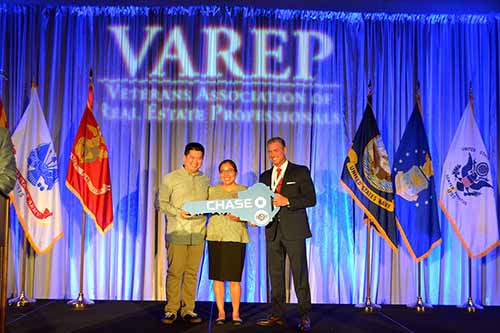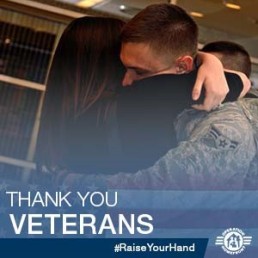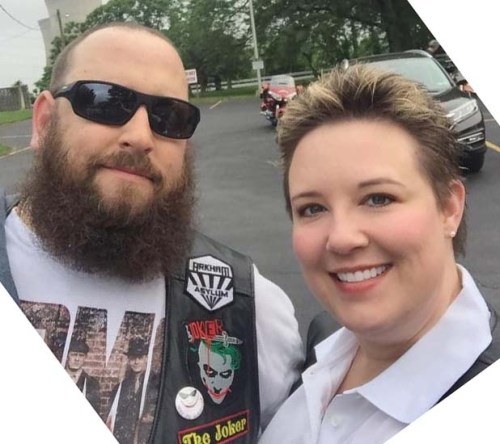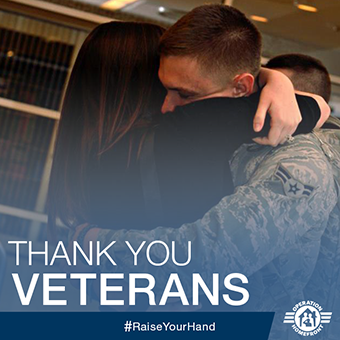To honor our Nation’s veterans, Operation Homefront would like to share the stories of the veterans who have touched our lives through our programs. Please join us every day as we feature a new veteran in our #11Days11Stories series leading up to Veterans Day 2019.
Arlacee and Thien Luu are a power couple, though they might laugh at the description. But anyone reading their story can see the power of their courage to never give up and have faith.
Arlacee, now an Army reservist, originally enlisted in the Army – and proudly served – to earn the education benefits and for the challenge. “A lot of people … did not think I could accomplish basic training, much less complete my contract,” Arlacee said. “I chose the Army because I wanted to accomplish my dream of joining the military and to prove that I am capable of anything.” In the Army, Arlacee, an E-4 specialist, was a surveyor and a chemical, biological, radiological and nuclear specialist. Her platoon worked on nuclear, biological and chemical reconnaissance vehicles.
Thien, her husband, served in the Army from 2007-11, including a 2009 Iraq deployment. He was medically retired after sustaining a traumatic brain injury from an IED blast.
Even these challenges did not shake them. Then came their transition from service.
Arlacee and Thein had no idea how to afford a place of their own and they ended up staying with family when they first left military service. This allowed them to save a little and prioritize their spending to care for their baby’s special needs.

Arlacee’s and Thien Luu’s 1-year-old son, Derek, was born without ears, and with a heart condition that required surgery to correct. He can hear with hearing aids, but because of his hearing impairment, Arlacee would like to enroll him in a school for the deaf. She acknowledges that caring for Derek, who is “beating the odds,” has been a lot of work for them, not only going to doctors’ appointments but also accepting his limitations.
On top of the childcare needs, they felt financially stymied trying to address their career goals, which required them to further their education. Arlacee’s wants to go to graduate school, and possibly work part time as an intern with the university’s geology department. She received a bachelor’s degree in biology in 2012 from New Mexico State University and will attend University of New Mexico in Albuquerque to pursue advanced degrees in geoscience, using her post-9/11 GI Bill education benefits. She would like to become a geoscientist, perhaps supporting the military or working for the U.S. Geological Survey.
Luckily, Arlacee remembered Operation Homefront’s Homes on the Homefront program. While they were stationed in Hawaii, an Operation Homefront (OH) employee described how JPMorgan Chase and other partners donated mortgage-free homes across the country to award to eligible military families. Once families are accepted into Homes on the Homefront (HOTH), they receive financial counseling to assist with saving, paying down debt and improving credit. Homes are deeded to those who successfully complete the program in two to three years.
A home in Albuquerque, New Mexico, caught her eye. Arlacee grew up on and near the Navajo reservation. She and her parents, who still live in New Mexico, are part of the Navajo Nation, and Arlacee missed the “remarkable” desert and mountainous landscapes, colorful scenery and clean air. Though she feared HOTH was too good to be true, she applied and was accepted for an Albuquerque home.
“We never, in a million years, thought we would be matched with a home,” Arlacee said. Using the Navajo word for thank you, she added, “Ahéhee’ for your generous donations.”
“We are extremely grateful, you have made a huge impact on our lives. This house is a true blessing, allowing Thien and I the opportunity to provide for our son and to continue our education. We are determined to make an impact and share our generosity with others, as you have done for us.” Arlacee said she also looks forward to the financial counseling that comes with HOTH because it will reinforce budgeting and the importance of saving, and hold them accountable. “It’s a push in the right direction,” she said.
Living in the HOTH home without the pressure of a mortgage is “such a relief,” Arlacee said. “It’s … a heavy burden off our shoulders …(and) we can focus on our child.”“Veterans go through different trials and different situations” such as injuries that sometimes require them to take things slower, Arlacee continued. “It makes life a little bit harder in different scenarios, compared to my coworkers … we face different challenges. [Operation Homefront] is a good organization to help alleviate some of these issues that we face.”
“I’m so grateful that … it’s not a too-good-to-be-true situation. We’re grateful to the donors.”
There are many families who still need our help. Check out our Current Needs page and you can help us serve America’s military families today.
…
Operation Homefront is a national 501(c)(3) nonprofit whose mission is to build strong, stable, and secure military

Just as these veterans raised their hand to swear an oath to serve their country, you, too, can join in committing to support them through Operation Homefront’s #RaiseYourHand campaign. Learn more at operationhomefront.org/RaiseYourHand
families so they can thrive — not simply struggle to get by — in the communities they have worked so hard to protect. For over fifteen years, we have provided programs that offer: RELIEF (through Critical Financial Assistance and transitional housing programs), RESILIENCY (through permanent housing and caregiver support services) and RECURRING FAMILY SUPPORT programs and services throughout the year that help military families overcome the short-term bumps in the road so they don’t become long-term chronic problems. Please visit us at www.operationhomefront.org to learn more or support our mission.









